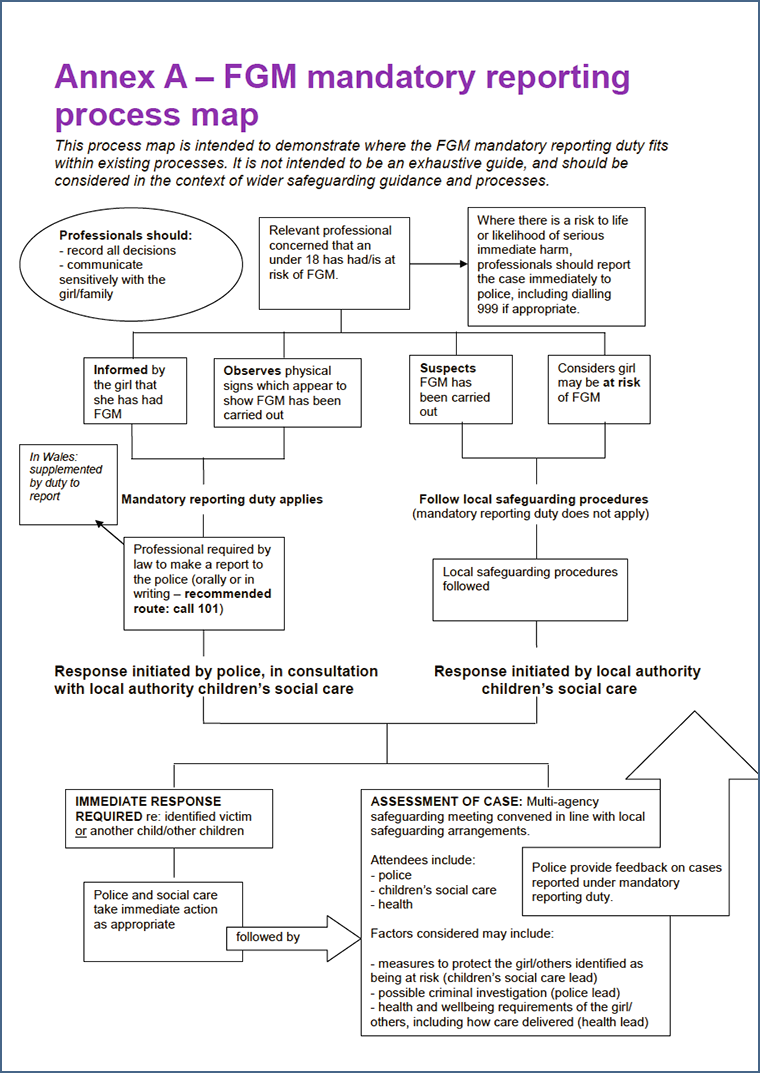Female genital mutilation (FGM) is the collective term for procedures which include the removal of part or all of the external female genitalia for cultural or other non-therapeutic reasons.
The practice is medically unnecessary, extremely painful and has serious health consequences, both at the time when the mutilation is carried out and in later life.
The procedure is typically performed on girls aged between 4 and 15, but in some cases it is performed on new-born infants or on young women before marriage or pregnancy.
FGM is also known as ‘sunna’ or ‘female circumcision’.
FGM is illegal in the UK and is a form of child abuse.
In England, Northern Ireland and Wales, civil and criminal legislation on FGM is contained in the Female Genital Mutilation Act 2003 (‘the 2003 Act’).
In Scotland, FGM legislation is contained in the Prohibition of Female Genital Mutilation (Scotland) Act 2005.
The Female Genital Mutilation Act 2003 was amended by sections 70-75 of the Serious Crime Act 2015.
The communities who practise FGM live mainly in 30 countries in Africa, the Middle East and Asia and in other countries such as the UK where people have migrated from these areas.
The World Health Organisation (WHO) (2008) classifies FGM as follows:
-
Type 1 - Clitoridectomy: partial or total removal of the clitoris (a small, sensitive and erectile part of the female genitals) and, in very rare cases, only the prepuce (the fold of skin surrounding the clitoris);
-
Type 2 - Excision: partial or total removal of the clitoris and the labia minora, with or without excision of the labia majora (the labia are the ‘lips’ that surround the vagina);
-
Type 3 - Infibulation: narrowing of the vaginal opening through the creation of a covering seal. The seal is formed by cutting and repositioning the inner, or outer, labia, with or without removal of the clitoris; and
-
Type 4 - Other: all other harmful procedures to the female genitalia for nonmedical purposes, e.g. pricking, piercing, incising, scraping and cauterising the genital area.
The rights of women and girls are enshrined in various universal and regional instruments, including:
-
the Universal Declaration of Human Rights;
-
the United Nations Convention on the Elimination of all Forms of Discrimination Against Women;
-
the Convention on the Rights of the Child;
-
the African Charter on Human and Peoples’ Rights; and
-
the Protocol to the African Charter on Human and Peoples’ Rights on the rights of women in Africa.
All these documents highlight the right of girls and women to live free from gender discrimination, free from torture, to live in dignity and with bodily integrity.
There is no Biblical or Koranic justification for FGM and religious leaders from all faiths have spoken out against the practice.
The justifications given for FGM are multiple and reflect the ideological and historical situation of the societies in which it has developed.
FGM is deeply embedded in some communities and is performed for cultural and social reasons.
It is usually carried out on girls before they reach puberty, but in some cases it is performed on new-born infants or on women before marriage or pregnancy.
It is often justified by the belief that it is beneficial for the girl or woman, but FGM is an extremely harmful practice which violates basic human rights.
Reasons include:
-
custom and tradition;
-
religion, in the mistaken belief that it is a religious requirement;
-
preservation of virginity/chastity;
-
social acceptance, especially for marriage;
-
hygiene and cleanliness;
-
increasing sexual pleasure for the male;
-
family ‘honour’;
-
a sense of belonging to the group and conversely the fear of social exclusion;
- enhancing fertility.
As with justifications for all types of abuse, these are NOT ACCEPTABLE.
Teachers’ duties on FGM
England and Wales
The FGM mandatory reporting duty is a legal duty provided for in the FGM Act 2003 (as amended by the Serious Crime Act 2015).
The legislation requires regulated health and social care professionals and teachers in England and Wales to make a report to the police where, in the course of their professional duties, they either:
-
are informed by a girl under 18 that an act of FGM has been carried out on her; or
-
observe physical signs which appear to show that an act of FGM has been carried out on a girl under 18 and they have no reason to believe that the act was necessary for the girl’s physical or mental health or for purposes connected with labour or birth.
Complying with the duty does not breach any confidentiality requirement or other restriction on disclosure which might otherwise apply. The duty is a personal duty which requires the individual professional who becomes aware of the case to make a report; the responsibility cannot be transferred. The only exception to this is if you know that another individual from your profession has already made a report; there is no requirement to make a second.
Members in England and Wales should follow the procedures as outlined in the Home Office advice Multi-agency statutory guidance on female genital mutilation and Annex A of the Mandatory reporting of female genital mutilation: procedural information reproduced below.

Annex A of the procedural information for mandatory reporting of female genital mutilation (Gov.uk)
Failure to comply with the duty in England and Wales
Failure by any teacher to comply with the duty will be dealt with in accordance with the existing disciplinary procedures within the school or college. FGM is child abuse and employers and the professional regulators are expected to pay due regard to the seriousness of breaches of the duty.
It is possible that a school could determine that dismissal is appropriate, as a result of the failure to comply, and the school is then obliged, by law, to consider whether to refer the matter to the National College of Teaching and Leadership (NCTL) in England or the Education Workforce Council (EWC) in Wales, as regulators of the teaching profession.
Northern Ireland
There is no mandatory reporting duty for teachers in Northern Ireland. If a teacher believes that a child or young woman is in immediate danger of FGM, it’s an emergency. You should contact the police on 999.
If you know that a child or young woman has been taken abroad for FGM, the police might put you in contact with the Foreign and Commonwealth Office. They can help British citizens abroad.
If a child discloses to you that they have been subjected to FGM, or believe they are at risk of FGM, you should consult the safeguarding lead in your school.
There is further information on NI Direct at Female genital mutilation.
Scotland
In Scotland, The Female Genital Mutilation (Protection and Guidance) (Scotland) Bill has been law since April 2020.
Whilst there is no mandatory reporting duty for teachers, schools do have a statutory responsibility to protect girls and young women at risk of FGM.
They must ensure that policies and procedures are clear, staff are supported and equipped to undertake the duties expected of them, and that there are clear lines of accountability.
Each local authority should have an identified operational lead with whom the ‘designated member’ of staff for child protection can consult.
Teachers should consult the school’s safeguarding lead if they have any suspicions that a girl may be at risk of FGM, has already undergone FGM or if a girl makes a disclosure to them.
All usual safeguarding procedures should be followed.
Further information can be found on Education Scotland's website at Local authority role and duties.
Further advice and guidance
For further advice and guidance, please contact NASUWT.

